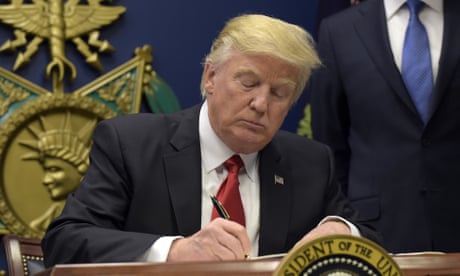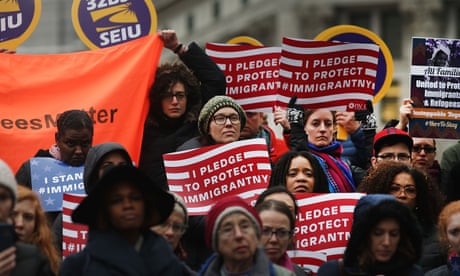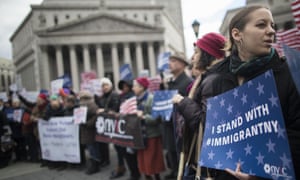

| Online: | |
| Visits: | |
| Stories: |

| Story Views | |
| Now: | |
| Last Hour: | |
| Last 24 Hours: | |
| Total: | |
In a Step Toward “Extreme Vetting,” the U.S. Has Ordered New Security Checks on People Seeking Visas for Work, Tourism or Family Visits
Trump signs ‘extreme vetting’ executive order for people entering the US
Trump announced and signed executive action that has widely been reported as a temporary ban on refugees and immigrants from Muslim-majority countries
Demonstrators take part in a rally in support of Muslims and immigrants Friday in New York City. Photograph: Mary Altaffer/AP
Marking a draconian shift in US policy, Donald Trump issued an executive order that will deny refugees and immigrants from certain Muslim-majority countries entry to the United States.

Donald Trump’s executive order on immigration – the full text
Trump’s unprecedented action will indefinitely close US borders to refugees fleeing the humanitarian crisis in war-torn Syria and impose a de facto ban on Muslims traveling to the US from parts of the Middle East and North Africa by prioritizing refugee claims “on the basis of religious-based persecution”.
“We are establishing new vetting measures, to keep radical Islamic terrorists out of the United States of America,” Trump said on Friday, during a visit to the Department of Defense. “We don’t want ’em here. We want to ensure we aren’t admitting into our country the very threats that our men and women are fighting overseas.”
Nearly two hours later, the White House made public his executive order, titled Protection Of The Nation From Foreign Terrorist Entry Into The United States.
The action puts in place a 90-day block on entry to the US from citizens from Iran, Iraq, Syria, Yemen, Sudan, Libya and Somalia. It is unclear whether the measure would apply to citizens of those countries on trips abroad who already have permission to live and work in the US.
It suspends the admittance of all refugees to the US for a period of 120 days, and terminates indefinitely all refugee admissions from Syria, where the nearly six-year war under Bashar al-Assad’s regime has led to more than 500,000 civilian deaths and created the displacement of an estimated 11 million Syrians.
It also caps the total number of refugees entering the US in 2017 to 50,000 – less than half the previous year’s figure of 117,000.
Donald Trump’s executive order means he is now officially gunning for Muslims—Moustafa Bayoumi
“We only want to admit those into our country who will support our country and love deeply our people,” Trump said.
As a candidate, Trump repeatedly pledged to bar entry to refugees fleeing war-torn Iraq and Syria. He also called for “a total and complete shutdown” of Muslim immigration to the US, a proposal that was met with widespread condemnation from both political parties.
Although Trump administration officials have continued to insist that the president’s actions are not targeted at Muslims or any one faith, the text of the executive order made explicit that the US government would prioritize religious minorities in Muslim-majority countries upon resuming its admittance of refugees:
“Upon the resumption of USRAP [US Refugee Admissions Program] admissions, the secretary of state, in consultation with the secretary of Homeland Security, is further directed to make changes, to the extent permitted by law, to prioritize refugee claims made by individuals on the basis of religious-based persecution, provided that the religion of the individual is a minority religion in the individual’s country of nationality.”
The president has himself said non-Muslim religious minorities would be prioritized for entry to the US. During an interview with the Christian Broadcasting Network on Friday, Trump said his administration would place an emphasis on helping persecuted Christians in the Middle East and North Africa.
“They’ve been horribly treated,” Trump said. “Do you know if you were a Christian in Syria it was impossible, at least very tough, to get into the United States?
“If you were a Muslim you could come in, but if you were a Christian, it was almost impossible, and the reason that was so unfair,” he falsely asserted.
“Everybody was persecuted in all fairness, but they were chopping off the heads of everybody, but more so the Christians. And I thought it was very, very unfair.”
Although Isis has targeted members of religious minorities in Syria and Iraq, including Christians and Yazidis, the vast majority of their victims have been Muslim.
The order also calls for the homeland security secretary and the secretary of state to draw up a list of countries in 60 days whose citizens should be banned until the US is satisfied that those countries are giving the US enough information to weed out visa applicants who are a public safety threat. New countries can be added to the list at any time.
It calls for the introduction of a new screening process for immigrants and a revision of the refugee admission processes. Refugees currently in the system must now wait until these new processes are drawn up before being accepted. It also initiates an examination of states’ rights to reject refugees.
Betsy Fisher, the director of policy at the International Refugee Assistance Project, said: “The executive order doesn’t say ‘we’re banning Muslims’. It says, ‘we’re banning people from Muslim countries except for the non-Muslims’.”
The number of refugees currently arriving to the US is not high by historic standards. In the early 1990s, more than 100,000 refugees were admitted to the country annually. But by 2015, the latest year covered by Department for Homeland Security (DHS) statistics, that figure had fallen to just 69,920 refugees. The number of refugees admitted to the US increased significantly in 2016, to 96,875, according to the Refugee Processing Center.
That figure represents just 0.03% of the US population of 323 million people.
Furthermore, the vetting process for refugees coming to the US is highly rigorous and can take up to two years.
Iraqis represented the second largest group of refugees arriving to the US in 2016. The new president’s action is expected to affect thousands of Iraqis who have served alongside the US military as interpreters, trainers and soldiers since the US-led invasion of the country in 2003. As of June 2016, there was a backlog of 58,000 Iraqis who were processed for possible resettlement in the US.
It says, ‘we’re banning people from Muslim countries except for the non-Muslims’.
Betsy Fisher, International Refugee Assistance Project
While announcing his executive action at the Department of Defense on Friday, Trump summoned the memory of the 9/11 terror attacks, saying “we will never forget the lessons of 9/11, nor the heroes who have lost their lives at the Pentagon.” However, none of the 19 hijackers who committed those attacks were from countries cited in the order.
In fact, an analysis of terrorist attacks on US soil between 1975 and 2015, published by the Cato Institute, found that foreign nationals from the seven countries singled out by Trump’s executive order have killed zero Americans.
Republicans were quick to embrace Trump’s actions as a matter of national security.
“Our number one responsibility is to protect the homeland,” House speaker Paul Ryan said in a statement. “I support the refugee resettlement program, but it’s time to reevaluate and strengthen the visa vetting process … President Trump is right to make sure we are doing everything possible to know exactly who is entering our country.”
But Democrats, immigrant and civil rights groups, and faith leaders from various backgrounds sharply condemned Trump’s action as counter to America’s longstanding tradition of opening its doors to refugees.
Chuck Schumer and Nancy Pelosi, the Democratic leaders in Congress, both invoked dramatic images of a sorrowful Statue of Liberty.
“Tears are running down the cheeks of the Statue of Liberty tonight as a grand tradition of America, welcoming immigrants, that has existed since America was founded has been stomped upon,” Schumer, the Senate minority leader, said in a statement.
“This is one of the most backward and nasty executive orders that the president has issued.”
Pelosi, the House minority leader, also referenced tears in the eyes of the Liberty Island sculpture at “how low this administration has stooped in its callousness toward mothers and children escaping war-torn Syria”.
“This administration has mistaken cruelty for strength and prejudice for strategy,” she said.
The Council on American-Islamic Relations (Cair) announced plans to file a federal lawsuit Monday on behalf of more than 20 individuals challenging what it dubbed as Trump’s “Muslim ban” executive order.

US refugee ban: Trump decried for ‘stomping on’ American values
“Our first amendment is under attack,” said Shereef Akeel, a co-counsel on the lawsuit.
“We, as attorneys, are foot soldiers of the American Constitution and took an oath to protect all from being targeted by the government because of their faith.”
The lawsuit will be filed in the US district court – western district of Virginia and challenge the executive order’s constitutionality on what a statement from Cair characterized as its intent and underlying motive “to ban people of the Islamic faith from Muslim-majority countries from entering the United States”.
Earlier this week, Nihad Awad, Cair’s national executive director said: “One of our nation’s darkest moments was during World War II, when we turned away Jewish refugees seeking our protection. We cannot allow religious bigotry to affect our willingness and ability to welcome those fleeing violence and persecution.”
The president announced the restrictive measures on Holocaust Memorial Day.



